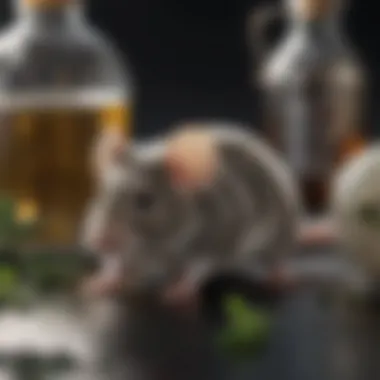Using Peppermint Oil to Deter Mice Naturally


Intro
The creeping realization of an unwanted guest in the home can bring about a wave of anxiety for any house owner. Among the most common intruders are mice, which can cause disruption and even pose health risks. This article dives deep into an eco-friendly alternative to conventional pest control: peppermint oil. With its rich aromatic profile and distinct properties, many swear by it as a natural mice repellent. Here, we will explore not only the efficacy of peppermint oil but also its practical applications in everyday home settings.
Pest Identification
Before diving into repellent strategies, it's essential to recognize the pests in question. Identifying the signs of mice in your home can help you tackle the problem swiftly and effectively.
Common Household Pests
Mice are not the only pests that can invade your sanctuary; however, they are among the most troublesome. Their small size and propensity to breed create significant challenges for homeowners. Alongside mice, other common intruders can include:
- Rats
- Ants
- Cockroaches
- Spiders
Identifying their presence involves understanding their characteristics and behaviors.
Signs of Infestation
When it comes to mice, their presence can often be detected through several telltale signs:
- Droppings: Finding small, dark pellets near food sources or nesting areas.
- Nests: Look for shredded papers, fabric, or insulation materials.
- Gnaw marks: Check for teeth marks on food packaging or furniture.
- Sounds: Listen for scurrying noises, particularly at night when mice are most active.
If you catch sight of these indicators, it's high time to consider a strategy.
Prevention Methods
Taking proactive measures is crucial in keeping mice at bay. Here, we will discuss modifications within your environment and simple maintenance tips that can contribute to a mice-free home.
Environmental Modifications
Making strategic changes in your surroundings can act as a deterrent for mice:
- Seal Entry Points: Inspect the exterior for cracks or gaps; even tiny openings can allow mice to sneak in.
- Remove Food Sources: Store food in airtight containers and clean up crumbs after meals.
- Declutter: A tidy space minimizes hiding spots, reducing the chance of mice setting up residence.
Home Maintenance Tips
Regular upkeep of your home can significantly decrease the likelihood of a mice invasion:
- Routine Inspections: Regularly check for signs of wear and tear on windows and doors.
- Maintain Landscaping: Trim back shrubs and bushes near your home; they can provide cover for mice.
- Proper Waste Disposal: Ensure your garbage bins are tightly sealed and not overflowing.
DIY Pest Control Solutions
For those looking to take matters into their own hands, natural solutions provide an effective and safer alternative to chemical pesticides.
Natural Remedies
Among various natural repellents, peppermint oil stands out due to its distinct scent that mice find off-putting. To harness its potency, consider:
- Peppermint Oil Spray: Mix several drops of peppermint oil with water in a spray bottle. Spritz along entry points and high-traffic areas.
- Cotton Balls: Soak cotton balls in peppermint oil and strategically place them in areas where mice are likely to enter.
DIY Traps and Barriers
Crafting simple traps or barriers can fend off any unwanted guests:
- Tin Can Trap: Fill a tin can with peanut butter as bait. Position it on a surface, and when a mouse climbs in, it won't be able to escape.
- Mousetraps: Consider alternative traps that don't harm mice but relocate them safely away from your property.
"Harnessing natural repellents not only creates a safer environment but also aligns with a sustainable lifestyle."
As we delve further into the mechanisms by which peppermint oil operates and its operational safety, we will gain a comprehensive understanding of leaning towards more earth-friendly solutions.
Understanding Mice Behavior
Understanding the behavior of mice is crucial when it comes to pest control, especially in seeking natural methods like peppermint oil. Mice are crafty little creatures. They’ve developed habits over centuries that help them survive and thrive in various environments, often leading them into our homes. By grasping their behavior, homeowners can tailor their approach to not only use peppermint oil effectively but also prevent future infestations.
What Attracts Mice
Mice are generally drawn to warm, safe places where food and water are readily accessible. Their keen sense of smell guides them to crumbs and other food sources. This is why kitchens, pantries, and food storage areas often become hot spots for mice. They typically don’t shy away from human leftovers, no matter how small. Diligently sealing food in airtight containers can curb their motivation significantly. Besides food, they seek out hidden corners, especially when the weather turns cold.
Common Habitats of Mice
When looking at where mice like to make their homes, we’ll spot them in the nooks and crannies of our living spaces. Basements and attics are prime locations given their dark, undisturbed nature, but they’ll also seize opportunities in wall cavities, under floorboards, and behind appliances. Gaps around pipes or vents offer easy gateways. An important aspect homeowners should note is that even a small hole can be an invitation for mice to make themselves comfortable.
Impact of Mice in Homes
It's not just having a few mice scurrying around that’s the issue—it's what they can do once they’re in. Mice can chew through wiring, leading to potential fire hazards. They can also spread diseases through their droppings and urine, posing health risks to anyone living in the space. Additionally, an infestation can quickly escalate; a couple of mice can turn into hundreds in no time. It's as if they multiply behind our backs. By understanding their behavior and the risks they bring, homeowners can take action before these furry intruders turn their cozy homes into a battleground.
"A proactive approach is the best prevention; understanding mice behavior is the first step in protecting your home."
By recognizing what draws mice in and where they prefer to hide, you can better use peppermint oil as a deterrent. Their natural avoidance of strong scents provides a feasible line of defense against these intruders. An informed strategy, based on their behavior, enhances the likelihood of maintaining a mice-free environment.
Foreword to Peppermint Oil


Peppermint oil, a fragrant and versatile essential oil, has gained attention for its potential use in pest control, particularly as a natural repellent for mice. The significance of discussing peppermint oil stems from its ability to offer an eco-friendly alternative to chemical pest control methods. As awareness grows regarding the hazards associated with synthetic repellents, natural options like peppermint oil are no longer a fringe topic but rather a sensible consideration for homeowners struggling with unwanted rodent guests.
In recent years, a wave of interest has surged around essential oils for pest management, blurring the lines between tradition and modernity. Recognizing the historical applications of peppermint oil not only illuminates its longstanding value but also reinforces its credibility in today's pest control conversations. By understanding this oil’s characteristics and benefits, homeowners can make informed decisions about using peppermint oil as a preventative measure.
Historical Use of Peppermint Oil
Historically, peppermint oil has been employed for various purposes beyond pest deterrence. Ancient civilizations, including the Egyptians and Romans, utilized peppermint for its aromatic properties and flavoring abilities. For instance, Egyptians used it in their embalming process, while Romans included it in their cuisine and medicinal recipes.
The medicinal applications of peppermint oil date back centuries. Various cultures recognized its benefits in promoting digestive health and alleviating headaches. Folk traditions have passed down the wisdom of peppermint for both its soothing properties and its intense scent, which proved effective at disguising less pleasant odors. Over time, the understanding of peppermint oil evolved, paving the way for its use in pest control today.
Extraction and Composition of Peppermint Oil
The extraction of peppermint oil is a process that captures the unique compounds responsible for its distinct aroma and repellent properties. Typically, steam distillation is used to extract oil from the leaves and flowering tops of the Mentha piperita plant. This method not only preserves the oil's essential characteristics but also ensures a high-quality product.
Peppermint oil is primarily composed of several key compounds, with menthol and menthone being the most significant. These compounds are what give peppermint its potent scent and its effectiveness as a repellent. In terms of composition, peppermint oil also contains a mix of other compounds like limonene, 1,8 cineole, and beta-caryophyllene, each contributing to its overall efficacy and aroma. The presence of these compounds creates a powerful blend, enticing to humans but unpleasant for mice.
In summary, understanding the history and composition of peppermint oil enhances our appreciation for its role in natural pest control strategies. It’s not just about warding off mice; it's about tapping into a long tradition of harnessing nature's offerings effectively.
Mechanisms of Repellency
Understanding how peppermint oil works as a repellent is essential for anyone looking to tackle a mice problem naturally. This section addresses the specific elements of peppermint oil that contribute to its efficacy and highlights the benefits of employing this natural solution over chemical alternatives.
Active Compounds in Peppermint Oil
Peppermint oil is a cocktail of various active compounds, each playing a unique role in pest deterrence. The dominant compound in peppermint oil is menthol, accounting for a significant portion of its composition. Menthol is not just the reason why peppermint has its distinct cooling flavor; it's also a powerful agent that affects how mice perceive their environment.
Aside from menthol, compounds like menthone and isomenthone generate their effects as well. These components trigger strong sensory reactions in rodents, leading to an aversion that can make any mouse think twice before entering treated areas.
"The intensity of smell can deter mice from even approaching where peppermint scent is prevalent."
The potency of these compounds is integral to the oil's effectiveness. Low concentrations can diminish its ability to repel, while higher concentrations may lead to improved results. This means when applying peppermint oil, one must consider not just the application method but also the right dosage for maximum impact on pesky rodents.
How Peppermint Affects Mice Senses
Mice rely heavily on their senses to navigate their surroundings. They use their sense of smell to find food, detect predators, and communicate. Peppermint oil disrupts this natural behavior. The intense aroma of the oil is overwhelming to mice, obscuring their ability to detect food sources and potential threats. This disruption makes it increasingly difficult for the mice to establish a comfort zone in areas treated with peppermint oil.
The chemical properties of peppermint can be boiled down to their impact on the olfactory receptors of mice.
- Anxiety Trigger: The overwhelming scent can cause anxiety in rodents, encouraging them to steer clear of areas with strong peppermint presence.
- Reduced Foraging Behavior: With their sense of smell muddied, mice lose interest in foraging and may even seek refuge from highly aromatic spaces.
- Behavioral Conditioning: Animals can learn to associate certain scents with discomfort. Continued exposure to peppermint oil can condition mice to avoid those spaces altogether in the future.
In summary, the mechanisms of how peppermint oil repels mice combine the unique qualities of its active compounds and the profound impact on mice's sensory processing. With its ability to disrupt natural behavior, peppermint oil stands out as a formidable contender in the natural pest control arena.
Efficacy of Peppermint Oil as a Repellent
Understanding the efficacy of peppermint oil as a repellent is central to harnessing its potential in natural pest control. It's not just about having a pleasant fragrance wafting through the air; it’s crucial for homeowners seeking safe and effective alternatives to commercial pest control products laden with harsh chemicals. Knowing how well peppermint oil works can inform practical usage, ensuring that it serves its purpose in deterring mice without unintended consequences.
Peppermint oil has gained traction as a popular choice for those looking to ward off mice effectively. However, to understand its effectiveness, it’s important to delve into scientifically-backed studies that shed light on its repellent properties as well as its practical applications.
Scientific Studies on Peppermint Oil and Mice
Research in the realm of essential oils has increasingly focused on natural repellents, with peppermint oil showing promise against rodent populations. A notable study conducted by researchers found that the scent of peppermint oil can indeed have a deterrent effect on mice. In controlled environments, mice were shown to avoid areas where peppermint oil was applied. The inhalation of the oil disrupted their normal behavior, making them feel uneasy and avoidant.
Another significant point of reference is research published in various journals indicating that the active compounds in peppermint oil, such as menthol, trigger sensory responses in mice that don’t sit well with them. The studies reveal that concentrations as low as 5-10% can be effective in repelling these pests. This information provides a solid foundation for those seeking to utilize peppermint oil for pest control; however, it also highlights the importance of regular reapplication, as the potency diminishes over time.
"Peppermint oil offers a natural solution, creating a less inviting environment for mice, while aligning with eco-friendly practices."
Comparative Analysis with Chemical Repellents
When juxtaposed with standard chemical repellents, peppermint oil presents itself as a viable alternative that comes with numerous benefits. Chemical repellents often contain toxic substances that can harm pets and humans, raising serious health concerns. The production of these chemicals also carries environmental implications, further compounding the need for safer methods.
Comparatively, peppermint oil emerges as a natural option, one that not only provides a repellent effect but also infuses your surroundings with a pleasant aroma. There's also no risk of chemical residue lingering in your home, which can be a significant concern for many homeowners.
Pros of using peppermint oil include:
- Non-toxic nature, making it safer for children and pets
- Accessibility, often found in most households or easily obtainable
- Eco-friendly as it's derived from a plant source
On the flip side, we must recognize certain limitations of peppermint oil. Its efficacy can be influenced by environmental factors like humidity or temperature, and it may not provide a long-term solution. Whereas traditional repellents might require less frequent application, peppermint oil calls for a solid commitment to regular user involvement and maintenance.
In the realm of pest control for diligent homeowners, understanding these dynamics between peppermint oil and conventional chemical repellents showcases the need for informed choices. Peppermint oil can effectively create discomfort for mice while also standing strong as an eco-friendly alternative, aligning well with the growing trend towards sustainable living.
Methods of Application
In the realm of natural pest control, the methods of application for peppermint oil often stand as the cornerstone of its effectiveness as a mice repellent. Understanding these techniques is crucial for homeowners seeking a humane and eco-friendly approach to deter these unwanted guests. The importance lies not only in how peppermint oil is used but also in ensuring its efficacy while minimizing any potential drawbacks.
Effective application methods can enhance the reach of peppermint oil’s active compounds, allowing homeowners to establish a strong barrier against mice. Choosing the right technique can determine how well the oil works in various environments, reflecting its potency as a repellent and aligning with the habits of the targeted pests.
Dilution Techniques
Dilution of peppermint oil is essential for effective use. Pure peppermint oil can be quite potent, which might not only be wasteful but can also overwhelm small spaces, making it less effective. Diluting it ensures not only better distribution across different surfaces but also a balance that maximizes the scent without causing irritation.
A common ratio for dilution is mixing 10 to 15 drops of peppermint oil into a spray bottle filled with water. This offers a manageable concentration that maintains its repellent properties while reducing the risk of adverse reactions, particularly in households with pets or children.
Creating Repellent Sprays


One of the most popular methods to utilize peppermint oil is by creating your own repellent spray. This method is both user-friendly and highly effective. When homeowners mix peppermint oil with water and a bit of dish soap, they create a mixture that can be easily sprayed in areas prone to mice activity.
To enhance effectiveness:
- Shake the mixture well before each use to ensure the components are properly blended.
- Focus on applying the spray in entry points, such as windowsills and door frames, which are common entryway for mice.
This simple yet powerful solution not only acts as a repellent but can also mask existing scents that attract mice. A well-applied peppermint spray can keep those little critters at bay.
Use of Cotton Balls and Pads
For homeowners looking for a more passive approach, using cotton balls soaked in peppermint oil can be a practical solution. This method doesn't involve any complicated preparation and leaves the oil to work its magic quietly.
To utilize this technique effectively:
- Soak several cotton balls in a mixture of peppermint oil and water.
- Place them strategically in areas like cupboards, attics, or near any holes that could serve as entry points for mice.
The lingering scent from the cotton balls will steadily permeate the space, making it less inviting for any mice that might be considering a new home. It's a simple yet efficient way to harness the power of peppermint oil.
Incorporating Peppermint Oil into Cleaning Products
Incorporating peppermint oil into cleaning products can provide dual benefits: enhancing the cleaning process while simultaneously repelling mice. For example, adding a few drops of peppermint oil to homemade cleaners can imbue surfaces with a fresh scent that is also a deterrent.
When creating your cleaning solution:
- Opt for vinegar or baking soda as a base, as both are effective cleaners.
- Add about 10 drops of peppermint oil to your cleaning solution before using it on countertop surfaces or floors.
This not only ensures that your home stays clean from a hygienic perspective but also serves to keep mice at bay with each cleaning session.
"A clean home is often a less attractive home for pests - combining cleanliness with natural repellents leads to a more harmonious living space."
By understanding these various methods of application, homeowners can adeptly harness the benefits of peppermint oil, creating a comprehensive, natural approach to pest control senza compromising their health or well-being.
Safety Considerations
Understanding the safety considerations when using peppermint oil is key, especially for homeowners looking to replace chemical repellents with a natural alternative. Although peppermint oil is generally recognized as safe when used correctly, there are aspects that require careful attention. The benefits of harnessing this oil for pest control shouldn’t overshadow the need for precautionary measures. A straightforward overview of potential risks will inform users to make safer choices.
Potential Allergic Reactions
When using peppermint oil, the possibility of allergic reactions should never be brushed aside. While many people can use essential oils without a hitch, some may experience discomfort or allergic responses. Symptoms might include skin irritation, redness, or itching upon direct contact. It’s crucial to perform a patch test prior to widespread application, especially if you have sensitive skin or allergies to mint.
- Patch Test Procedure:
- Apply a small diluted amount of peppermint oil on the inner forearm.
- Wait for 24 hours to check for any negative reactions.
- If redness or swelling occurs, avoid using the oil further.
"Even natural remedies can provoke reactions; the safe route includes initial caution."
To reduce the chance of adverse reactions, consider diluting peppermint oil with a carrier oil, such as coconut oil or olive oil. This combination can lessen the concentration applied to the skin while maintaining its repellent properties.
Toxicity Concerns for Pets
Pet owners need to tread carefully when incorporating peppermint oil into their pest control houses. While peppermint oil is effective against mice, it may also pose risks for dogs and cats. Studies indicate that ingestion or excessive exposure could lead to symptoms like drooling, vomiting, or even more severe reactions in some cases.
- Dangers to Pets:
- Ingestion: If a pet ingests peppermint oil, it may trigger gastrointestinal upset.
- Topical Exposure: Direct contact with diluted oil can lead to skin irritations in animals.
To be on the safe side, keep any peppermint oil sprays or saturated cotton balls in areas that pets can’t easily access. Furthermore, consult with a veterinarian if you're unsure about the safety of peppermint oil in your home, particularly around your furry friends.
In summary, taking safety measures when using peppermint oil is essential for a smooth experience with its applications. Balancing efficacy and safety ensures that households not only repel pests but also maintain a healthy environment for all inhabitants.
Limitations of Peppermint Oil Use
Whenever we discuss peppermint oil and its prowess in repelling unwanted mice, it's vital to recognize its limitations as well. This doesn’t dismiss its value; rather, it offers clarity and a balanced perspective for homeowners. Understanding the drawbacks can shape expectations, bolster strategies, and foster a more thorough approach to pest control in the home.
Environmental Factors Affecting Efficacy
The effectiveness of peppermint oil as a natural repellent can fluctuate due to various environmental influences.
- Humidity and Rain: A high level of humidity can dilute peppermint oil, reducing its pungency. When it rains, outdoor applications may wash away. This chipping away could lessen its capacity to deter mice.
- Temperature Extremes: On chilly nights or during sweltering days, peppermint’s aroma can dissipate. Extreme temperatures engage in a war of attrition against the oil's effectiveness, diminishing its repellent quality.
- Surrounding Scents: If your yard or home exudes other strong odors—whether from household items, food waste, or even competing plants—this might mask the peppermint smell. Mice can either lose the scent trail or become accustomed to it, undermining your efforts.
Thus, while peppermint oil can certainly be a useful tool, its potency is not a guarantee. Homeowners must be prepared for variations in effectiveness based on the environment they are in. This understanding allows for the consideration of alternative measures or supplementary repellents in varying conditions.
Time and Frequency of Application
Timing is everything when it comes to utilizing peppermint oil. Just as you wouldn’t water a plant once a year and expect it to flourish, the same principle applies here.
- Application Frequency: To reap the benefits of peppermint oil, it’s crucial to apply it regularly. Fading scent over time dilutes its protective capabilities. A recommendation for homeowners is to refresh the oil weekly or bi-weekly, especially in high-traffic mouse areas.
- Seasonal Adjustments: Depending on whether it's summer, winter, or another season altogether, you may need to adjust how often you apply peppermint oil. In seasons where mice typically seek shelter indoors, like during cold snaps, an increase in application may be needed.
- After Precipitation: Following heavy rainfall or accidental spillage of water, it’s essential to reapply. Dampness can wash away many of the enchanting properties that make peppermint oil a deterrent.
"Regular application is crucial; don’t let your guard down—mice are crafty little creatures."
This creates a rhythm—one that keeps potential infestations at bay and underscores that being proactive is a key player in pest management. By taking note of environmental factors and maintaining a consistent application schedule, you'll better harness peppermint oil's potential within your home.


Sustainable Pest Control Practices
In the landscape of modern pest control, the rise of sustainable practices reflects a broader shift towards eco-friendly living. Households, once reliant on harsh chemicals, are gradually recognizing the immense value of integrating solutions that not only protect their spaces but also care for the environment. Peppermint oil, prominently featured in this article, emerges as a prime example of a natural deterrent that harmonizes effectively with sustainable pest control practices.
Integrating Natural Repellents
When employing sustainable pest control, it becomes vital to prioritize natural repellents, like peppermint oil, over synthetic chemical alternatives. Not only do these natural options help in reducing chemical exposure for families and pets, but they also minimize ecological footprints. Peppermint oil contains compounds that mice find repulsive, making it an ideal candidate for integration into various pest deterrent strategies.
"Natural repellents serve as a bridge, allowing us to maintain our homes without sacrificing our values."
Utilizing peppermint oil allows homeowners to explore multiple avenues of application. Options include infusing it into cleaning solutions, making repellent sprays, or even placing soaked cotton balls in areas frequented by rodents. This approach fosters a connection between pest control and overall household wellness.
Preventive Measures for Mice Infestations
Preventing mice infestations extends beyond merely deploying peppermint oil; it encompasses a thoughtful strategy combining both physical barriers and behavioral adjustments. Recognizing the signs of mice entry points is fundamental. Common entry spots include holes around plumbing, gaps in walls, or poorly sealed windows. By closing these gaps with appropriate materials—think steel wool for small openings—homeowners create a less inviting environment for intruders.
Additionally, maintaining cleanliness plays a paramount role in making spaces less appealing to mice. Regularly storing food properly and promptly addressing spills can significantly reduce the risk of attracting these pests.
In summary, integrating natural repellents like peppermint oil and adopting preventive measures forms the cornerstone of sustainable pest control. This dual approach not only addresses immediate concerns but also cultivates an environment less conducive to future infestations.
Alternative Natural Repellents
Exploring alternative natural repellents is crucial for those looking to ward off mice without resorting to harsh chemicals. Homeowners increasingly prefer methods that are both effective and environmentally friendly. Using natural repellents, such as peppermint oil, not only helps in minimizing the use of synthetic substances but also aligns with sustainable pest management practices. This inclination towards natural solutions reflects a broader trend in society toward preserving our ecosystems while tackling the practical challenges of household infestations.
Other Essential Oils for Mice Control
While peppermint oil takes center stage, it's worth noting that several other essential oils can also deter mice effectively. Here are a few notable options:
- Lavender Oil: Known for its relaxing scent, lavender also boasts properties that mice find unpleasant. Spritzing a lavender-infused spray in areas prone to mice can create an aroma that sends them scurrying.
- Eucalyptus Oil: This oil not only has a strong scent but is also known for its antimicrobial properties. Mice are typically put off by the potent aroma of eucalyptus.
- Cinnamon Oil: The warm and spicy scent of cinnamon acts as a natural repellent. Sprinkling cinnamon powder in areas where you've spotted mice can be a deterrent.
These oils can be combined with peppermint for a multi-faceted approach. Mixing them creates a potent blend that might just do the trick. Additionally, make sure the oils are diluted properly before applying to avoid any adverse reactions.
Herbs and Plants That Deter Mice
In addition to essential oils, specific herbs and plants can naturally repel mice. Integrating these plants both in and outside your home can stave off unwanted rodent guests:
- Mint: Just as peppermint oil works, the plant itself can be just as effective. Placing pots of mint around your home, particularly near entrances, keeps mice away.
- Basil: This fragrant herb is often used in cooking, but its scent also deters mice. Having basil plants on windowsills or near food sources can make a big difference.
- Sage: Renowned for its medicinal properties, sage also has a scent that mice dislike. Growing sage in your garden could offer dual benefits.
Incorporating such plants into your decor or garden not only enhances aesthetics but also provides an additional layer of protection against mice.
"Using natural repellents allows for a cleaner, healthier home while effectively managing pest challenges."
Ultimately, homeowners can create a multifaceted pest control strategy by combining these essential oils and herbs with peppermint oil. This approach ensures a comprehensive defense against mice while aligning with eco-conscious living.
Case Studies and Testimonials
When delving into the practical application of peppermint oil as a natural mice repellent, the significance of case studies and testimonials cannot be overstated. They serve as real-world examples that not only illustrate the effectiveness of the oil but also provide relatable situations for homeowners who may be skeptical or looking for tried-and-true methods. This section sheds light on how individuals in various contexts have employed peppermint oil, what results they achieved, and the nuances involved in their experiences.
Case studies reveal how the oil's efficacy goes beyond theoretical discussions, grounding the recommendations in lived realities. Homeowners and tenants who share their stories contribute invaluable insights into the practical considerations of using peppermint oil, thus equipping others with knowledge that is both useful and easy to apply. Not every situation will be identical, but these testimonials often highlight common threads, challenges faced, and clever tricks developed along the way.
"It’s one thing to read that peppermint oil can repel mice, and another to hear from someone who actually made it work in their own home."
Let's take a closer look at some success stories from homeowners and a review of researched findings.
Success Stories from Homeowners
Many homeowners have turned to peppermint oil as a more sustainable and non-toxic solution for their pest problems. For instance, a family in rural Vermont reported persistent mouse activity in their storage shed. Tired of the traditional strategies that weren't yielding results, they decided to give peppermint oil a try after reading about its benefits online.
They mixed a few drops of pure peppermint oil with water in a spray bottle and applied it both inside and outside the shed. Within a few days, they noticed a marked reduction in mouse sightings. They emphasized that the task was straightforward and did not involve handling harsh chemicals, making it a safe option around their children and pets.
In another account, a couple living in an older home found that peppermint oil significantly reduced the number of mice that scurried through their kitchen at night. They placed peppermint oil-soaked cotton balls in strategic areas, primarily near entry points and in cabinets. They noted, however, that maintaining this practice was necessary. They shared that the aroma was inviting for their family but effectively repulsive for any unwelcome guests.
Research Findings and Field Trials
The journey into peppermint oil as an effective repellent is not merely anecdotal. Various research initiatives have explored its impact on rodent behavior, and field trials have provided quantifiable data. One study published in the International Journal of Pest Management indicated a significant deterrent effect on mice when peppermint oil was diffused into their living space. The research documented up to a 70% reduction in visits by test subjects in areas saturated with peppermint oil compared to control setups.
Furthermore, a field trial conducted by pest control experts indicated that when peppermint oil was integrated as part of a comprehensive pest management system, its effectiveness was enhanced. The trial revealed that combining peppermint oil with other natural deterrents, such as vinegar and eucalyptus oil, resulted in an even greater decline in rodent presence.
The findings highlight not only the potential for peppermint oil in deterring mice but also emphasize the need for repeated and consistent application. The success in real-life instances supports the conclusions drawn from scientific studies—adding credibility to the claims regarding peppermint oil's capabilities.
End
The significance of the conclusion in the article cannot be overstated. It’s where we synthesize the extensive information gathered, providing a clear path forward for those who seek to utilize peppermint oil in the quest for natural pest control. This section is crucial for housewives and homeowners contemplating eco-friendly alternatives to chemical repellents. The discussion not only summarizes the key insights but also encourages a thoughtful approach to pest management that is rooted in natural solutions.
Summary of Key Insights
Peppermint oil has emerged as a promising alternative to traditional chemical pest control methods. Its effectiveness is chiefly attributed to its unique composition of compounds, specifically menthol and menthone, which irritate the sensory systems of mice. The principles that underpin its efficacy include:
- Natural and Non-Toxic: Unlike many commercial rodenticides, peppermint oil does not pose a significant risk to children and pets provided it’s used correctly.
- Practical Application Methods: Various forms, such as repellent sprays or infused cleaning products, provide versatility in how peppermint oil can be utilized throughout the home.
- Holistic Pest Control: Integrating peppermint oil not only repels mice but also fits seamlessly into a broader strategy of preventative measures against infestations.
Additionally, the anecdotal evidence from homeowners suggests that consistent application yields positive results. However, this remedy is not a one-size-fits-all solution and should be used in conjunction with other natural repellents and household maintenance strategies.
Future Directions in Natural Pest Control Research
As we look ahead, the field of natural pest control, particularly regarding peppermint oil, holds vast potential. Here are some promising directions:
- In-Depth Studies: More comprehensive scientific studies examining peppermint oil’s specific effects on various rodent species could enhance our understanding and validate its effectiveness further.
- Combining Essential Oils: Exploring the efficacy of blending peppermint oil with other natural repellents might increase its repellency spectrum against a wider range of pests.
- Sustainable Practices: Research focusing on sustainable farming and production techniques for sourcing peppermint oil can aid in minimizing environmental impact, aligning pest control with eco-conscious consumer values.
This forward-looking approach could not only solidify peppermint oil’s place in home pest control but also champion a shift toward more sustainable, holistic solutions in pest management.















